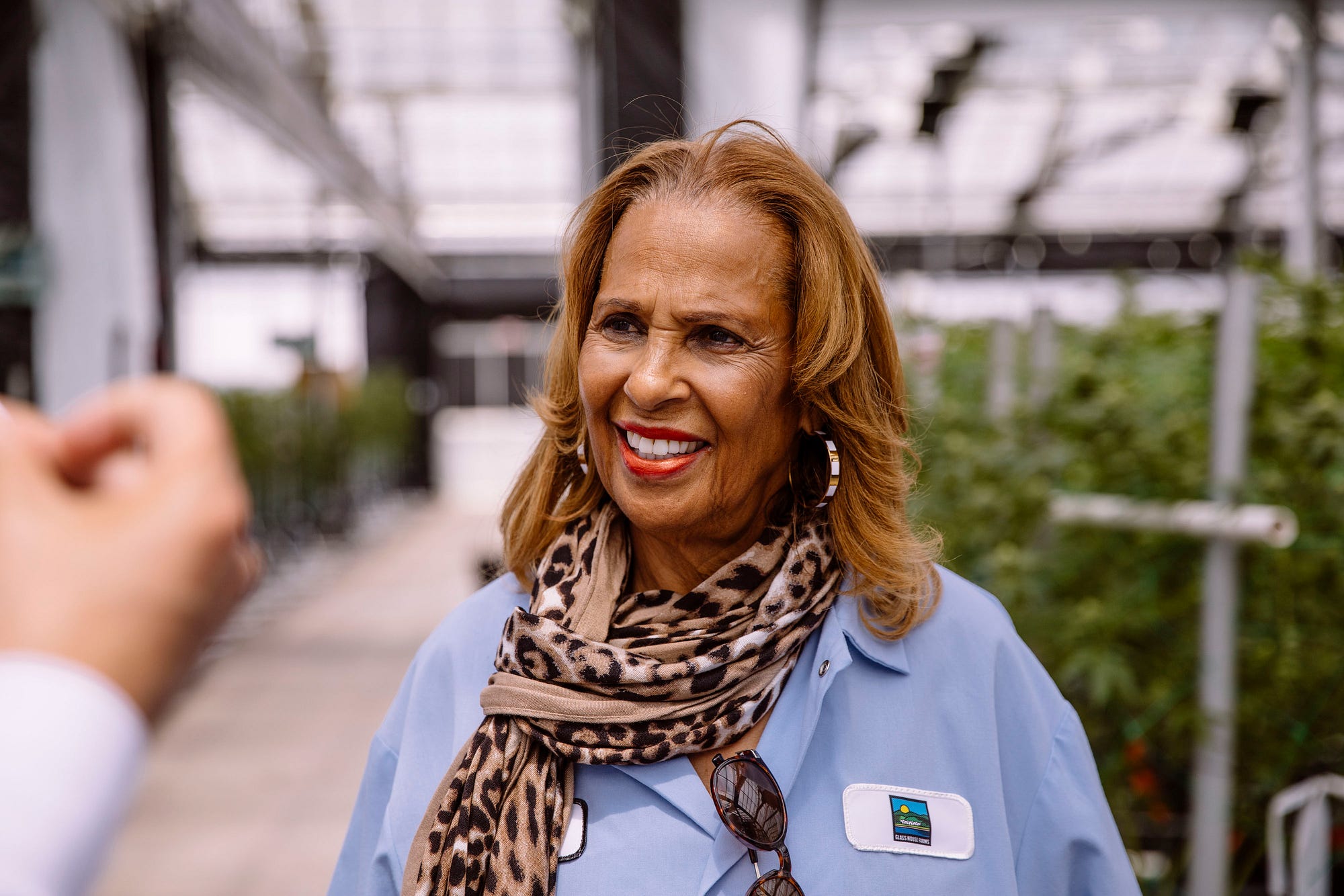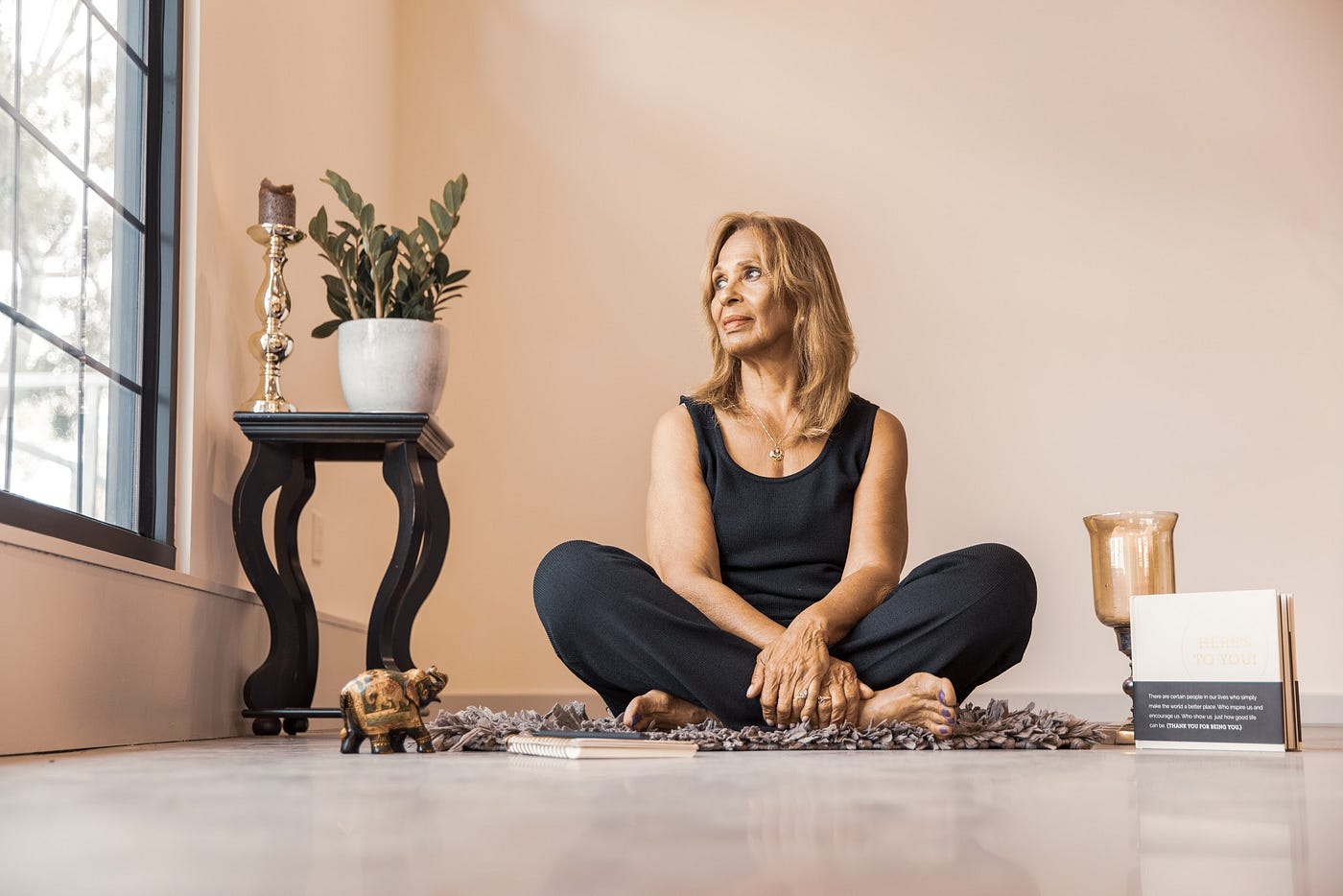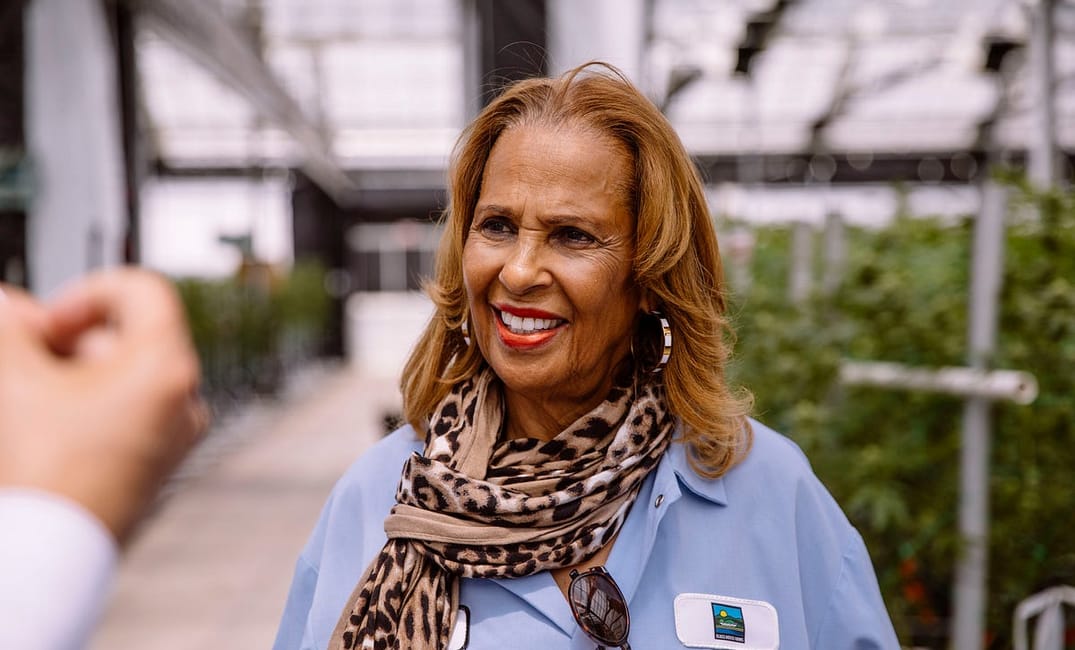
Sue Taylor was the first cannabis celebrity I ever met. I spotted her, chic and golden-haired, in the hotel bar at a weed conference in a San Francisco hotel back in 2017. She greeted a line of admirers with a warm smile, but her commanding presence signaled she wasn’t someone to be messed with.
I had read about Taylor when she graced the March cover of cannabis culture magazine GreenState, which called her “medical cannabis’ senior weapon.” The former Catholic school principal had once been staunchly against marijuana, but when she discovered the plant could ease her arthritis, she had a change of heart that fueled a major career switch to educate seniors about cannabis for pain relief.
I was drawn to Taylor for many reasons: a shared last name (my maiden name is Taylor, no relation), my 12 years of enduring Catholic school principals in the East Bay, and admiration for her business success. But, perhaps most notably, we were two Black women out of only a handful of people of color at the conference, reflective of the overall industry’s lack of diversity. As a budding cannabis writer, I admired her ability to carve a space for herself in an industry that’s increasingly white and male. I also happen to be from Berkeley, where she was planning to open a dispensary once recreational sales began in 2018.
Three years later, on a sunny Friday afternoon last month, I found myself sitting across from Taylor again. She had just cut the ribbon at the opening of Farmacy Berkeley, her new dispensary half a mile from the South Berkeley home where I grew up during the era of Just Say No.
“I used to be scared to death of cannabis, like most elders my age.”
Seated next to me on the brightly lit, almost spa-like sales floor with her shoes kicked off, Taylor explained the 10-year road to achieving her goal — one she never could have imagined. For most of her life, Taylor admits she viewed cannabis along the same perilous lines as heroin and crack cocaine.
“I used to be scared to death of cannabis, like most elders my age,” Taylor said, relaxing a bit after the flurry of the opening event. “But as I personally saw the healing and started working with seniors, I began to change my mind.”
The evolution in thinking started when her son Jamaal enrolled in Oakland’s cannabis college, Oaksterdam University. She was so alarmed that she packed two suitcases and headed back to the Bay from Atlanta, determined to, as she puts it, “save him.” Instead, she heard him out and began questioning everything she thought she knew about the plant, which took her life on an entirely new trajectory.
Instead of moving back to her then-home Atlanta, Taylor became a full-fledged cannabis advocate. She went on to serve as head of senior outreach at Oakland dispensary Harborside Health Center, as well as gain state certification as a medical cannabis educator. Eventually, she became commissioner on Aging for Alameda County. As the Golden State transitioned from medical marijuana to the world’s largest legal cannabis market, Taylor, a self-proclaimed “Goody Two-Shoes,” quickly became the face of senior cannabis use.
In 2016, Taylor became the fourth person — and first African-American woman — to be awarded a dispensary license in Berkeley.
Today, Taylor takes a daily dose of cannabis tincture from her Mama Sue product line to help relieve arthritis and back pain, with the added benefit of what she calls “a little uplifted feeling.”
Farmacy Berkeley Lead Cannabis Specialist Laura Herrera says their mission is to make people (specifically elders) comfortable with cannabis so “they can transition from pharmaceuticals to cannabis in the best way.”
That means in addition to a broad assortment of cannabis products, including local brands like Kiva Confections, SFRoots, and their proprietary Mama Sue line of tinctures, Farmacy Berkeley offers educational seminars. I attended one with my mother two weeks after the dispensary opening. Taylor shared her personal journey from detractor to advocate, as well as an overview of marijuana basics, such as the plant’s most famous chemical compounds: THC is psychoactive and CBD is not, which is why it’s possible to use certain cannabis products without getting high.
After the session, my mom commented multiple times that she appreciated hearing about cannabis from someone in her age group who was dealing with similar ailments.
“I did a lot of modeling on how to talk and teach and educate seniors through what Taylor was doing,” says Tali Eisenberg, Farmacy’s senior lead specialist. “If someone who looks like you is saying they’ve been educated and been touched by this plant, that’s how stigma changes, that’s how medicine changes, that’s how health access changes.”
Ten years is a long time to invest money and resources toward opening any business, let alone one in California’s tumultuous cannabis industry, but Taylor was determined.
“A lot of people come into the cannabis industry, they’re just coming in for the money. When things go wrong they’ll fade out. Not us,” she says of her family. “We stayed in 10 years because we were passionate about it, and I made a conscious decision years ago that I would make the world a better place because I lived.”
Berkeley, home to the nation’s oldest cannabis dispensary, Berkeley Patients Group, has current regulations that allow for a total of six cannabis retail licenses, and the City Council unanimously decided to award Taylor the fourth.
Taylor notes that her licensing wasn’t affiliated with a cannabis social equity program, pioneered in neighboring Oakland intended to reduce barriers of entry into the industry for the communities most targeted by the war on drugs: primarily black and brown people.
By primarily targeting elders, Farmacy is capitalizing on one of the fastest-growing consumer segments in the burgeoning industry.
Several cities have programs modeled after Oakland’s; Berkeley doesn’t, but is working on it. In 2017, Marijuana Business Daily found that 81% of cannabis business owners and founders are white, while only about 4% are African American. Despite good intentions, the initiatives have been plagued with scandals and controversy, including in Los Angeles and Massachusetts.
“We got this on our own merits, our own family’s money,” Taylor said, placing them among the overwhelming majority of owners in the sector who rely on self-funding to raise the six and seven figures needed to start their businesses.
By primarily targeting elders, Farmacy is capitalizing on one of the fastest-growing consumer segments in the burgeoning industry. According to a new study from NYU Grossman School of Medicine published in JAMA Internal Medicine, cannabis use in American adults age 65 and older increased 75% between 2015 and 2018. This is in addition to a Pew Research finding that 63% of Baby Boomers favor cannabis legalization. California delivery service Eaze is definitely feeling the boom, reporting that the number of Boomers who signed up for the service increased 91% in 2019.
Taylor understands the importance of education for seniors who, after being misinformed their whole lives about the Federal Schedule 1 drug, may be considering cannabis for their own needs now that it’s legal in some form in more than two-thirds of the country.
“Seniors don’t want to get high, they want to get well,” she said. “So that’s our main focus.”

The significance of Taylor’s involvement in the industry isn’t lost on Herrera.
“It’s a big deal,” Herrera said. “She’s a senior citizen and a black woman tipping the scales of social acceptance and social justice. She and her family are majority owners of this establishment, and she’s speaking to the largest demographic in the United States right now.”
Being an elder black woman in an industry dominated by white men doesn’t faze Taylor one bit.
“Actually, it’s been quite good because it’s all about balance. They needed us — the yin and the yang. We softened the industry for them,” she says, locking eyes with me knowingly, “and then we put ’em in check.”
With her business now up and running, Taylor can’t help but reflect about what it’s taken to get here.
“I’m 72 years old. Not many people 72 years old are still creating business. Most of them don’t even like themselves,” she said. “I love me, I love the person I’ve become doing this work. I’m going to rock it for as long as I’m alive, you hear me?”
Yes ma’am, I sure do.







